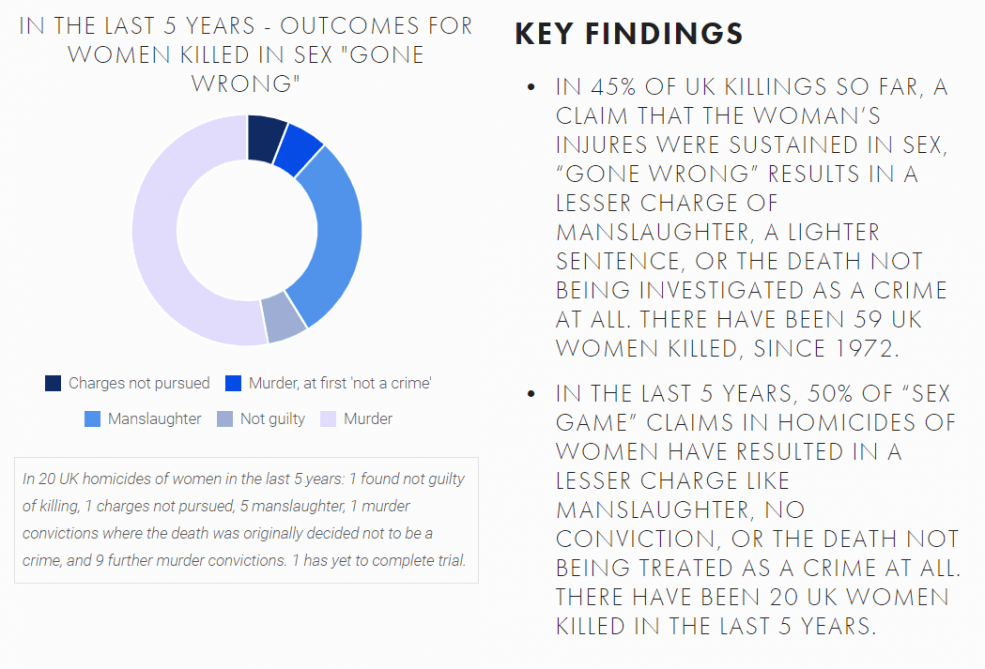As women continue struggling to make their voices heard in situations of violence, we examine the latest court defence trend which sees their private sexual narratives used against them – even when they can’t defend themselves.
In little-understood and alarming ways, sexual violence against women is still on the rise. Just this month, 21-year-old Grace Millane was murdered by a man she met on Tinder while backpacking in New Zealand – strangled to death during sex with him at his house. However, as disturbing as the case itself, the high-profile trial that followed has revealed a frightening new trend. One that sees women’s personal sexual histories used against them in court.
The ‘rough sex’ defence, which shows no signs of slowing down with almost half of all UK cases proving successful in the past five years, leaves a very clear message: if you die as a young woman away from your home, your sex life has the potential to overshadow your whole life.
Even though a guilty verdict was delivered by the jury in Millane’s case (she is now the 59th woman to be killed in a case that used the ‘rough sex’ defence in court), the trial itself has received a staggering amount of backlash for the way it presented her sexual history as evidence against her. Her use of fetish dating apps such as Whiplr and previous participation in BDSM was used to prove that she enjoyed certain types of sexual practices, and one of her ex-boyfriends was even called to attest that she enjoyed being choked for sexual gratification.
Now, I understand the requirement to cover all bases in these situations, but there needs to be a line between looking into someone’s background for more insight into a case and explicitly using it to shirk blame onto them when they have absolutely no way of standing up for themselves – especially in these sensitive circumstances. In my opinion Millane’s situation says a lot about a much wider-reaching problem within sex today. The case proves that it’s still considered taboo for women to enjoy more ‘unconventional’ sexual practices whilst it remains the ‘norm’ for men to associate violence and dominance with sex (this can be seen very obviously in the different porn marketed at women and men). This is a slippery slope to the kind of prevailing and undeniable sexism – almost sadism – we see in the rough sex defence, which can be exploited by people who aren’t just sexists, but murderers.


Horrified by the emerging ‘rough sex’ defence trend and the 90% increase in its use over the last half-decade, Fiona McKenzie set up We Can’t Consent To This, a campaign group with a mission to have the so-called ’50-shades’ defence thrown out of British courts. Alongside Labour MP Harriet Harman, WCCTT is working to add a clause to the Domestic Abuse Bill that would register it illegal for any man that’s killed a woman to claim she consented to the violence that resulted in her death, because consenting to certain ‘sex games’ is not the same as consenting to be murdered.
The ‘rough sex’ defence is also highly discouraging for victims of sexual abuse who want to come forward, as they worry their sex lives have the potential to be used to shame them (which is already far too common in the current court system as it is).
‘This appears to be a totally traditional male violence against women that seems to be absolutely in-line with wider violence against women,” says McKenzie. “But for some reason in the criminal justice system, and to some extent in the news media as well when it’s reported, it’s believed that the women have said ‘yes, I want to be horribly injured. I want to be hospitalised by my sex life’. Often you’ll find nothing about the person who has died beyond their name and these lurid accusations that she consented to all kinds of sexual activity before she died.’
The complicated intersection of violence and sex is an urgent matter. More and more women are dying due to confusion surrounding how people are having sex in the 21st century. It’s no surprise that rough sex has gained a great deal of popularity lately, especially when you take into account the proliferation of certain types of porn. What’s concerning about the fact that more young people are starting to partake in sexual practices on the kinkier end of the spectrum is that with a lack of openness about said practices, it’s very easy to either take things too far or assume that something’s okay to do when it actually makes the other person uncomfortable and sometimes scared.























